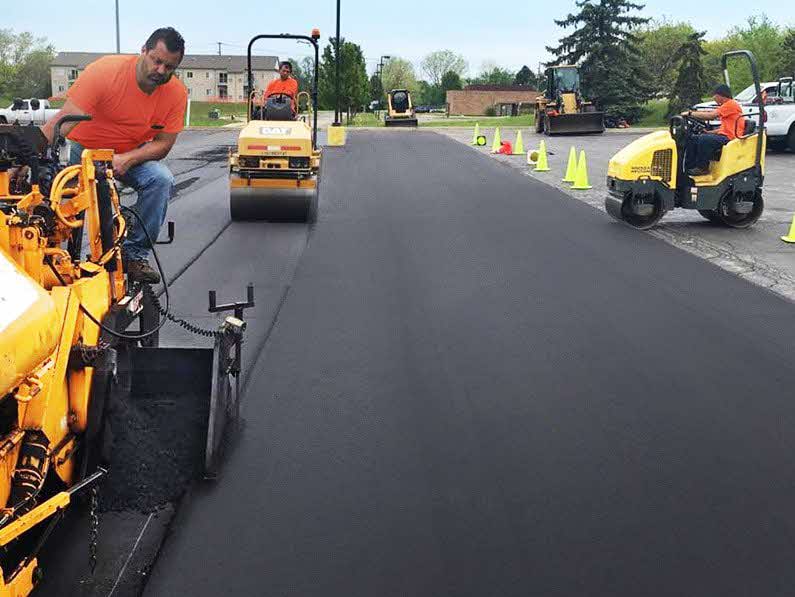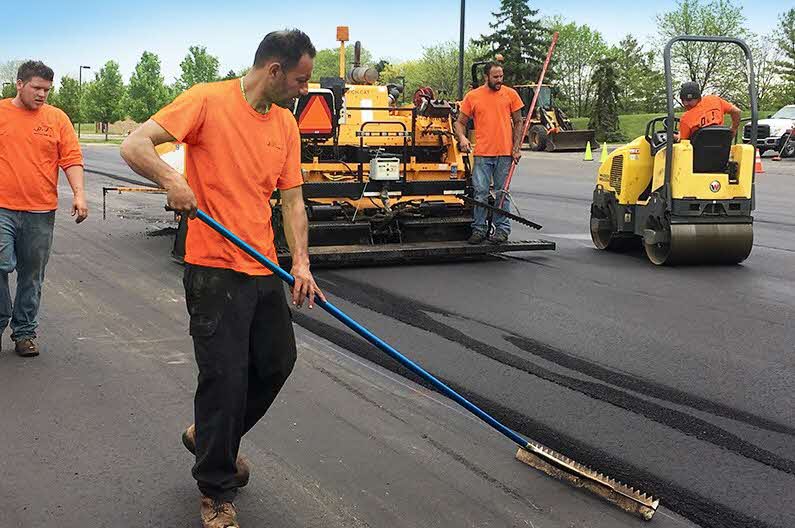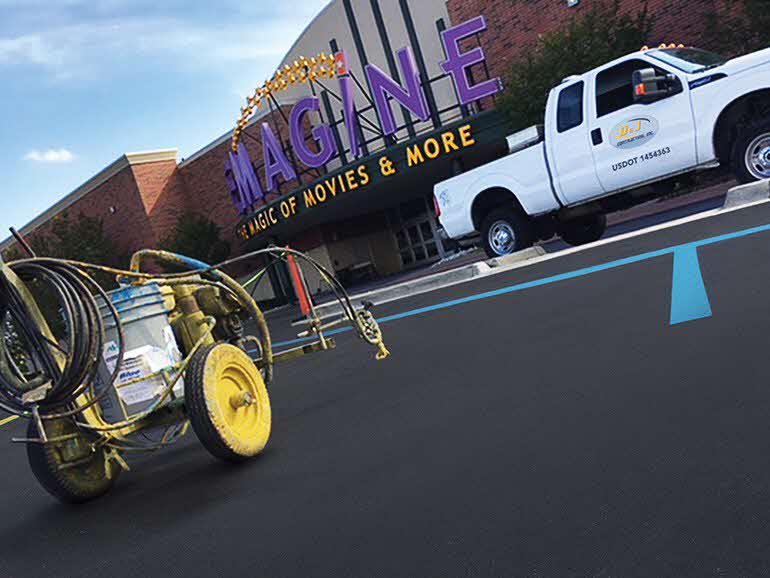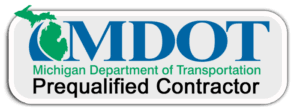Asphalt Driveways Troy Michigan
We Are Locally Owned
& Operated For 36 Years
Contact Us Today!
About Asphalt Driveways
Introduction to Asphalt Driveways
If you are in search of a cost-efficient, reliable, and exceedingly serviceable selection for your commercial property, look no further than asphalt driveways. Asphalt driveways are an excellent choice for properties due to their array of remarkable benefits coupled with their exceptional hard-wearing properties. Whether you are contemplating an upgrade or planning a new driveway construction, understanding the value of asphalt as a material and selecting the right driveway asphalt paving companies near you for superb service is paramount. Here is an insightful guide to help you understand the process and benefits of asphalt driveways.
The Process of Driveway Asphalt Paving
Installing an asphalt driveway is a multi-step process that starts with site preparation. The ground should be properly leveled, and any weeds, roots, or stones removed to prevent future complications. A solid sub-base is then prepared using crushed stone to provide a robust and stable platform. This is followed closely by the application of the binder layer, which is a large aggregate mixed with oil to ensure strong adherence.
Lastly, the final layer, known as the top layer, is applied. This layer comprises of a small aggregate mixed with oil, providing a neat finish and attractive look to the driveway. The surface is then rolled to ensure the asphalt is properly compressed and uniform. After a few days of curing, your new asphalt driveway is ready for use. When the process is expedited by driveway experts asphalt paving professionals, you are guaranteed a refined, enticing, and long-lasting surface that delivers beyond expectations.
Finding the Right Asphalt Paving Company Near Me
Having understood the process of asphalt driveway installation, the next step is finding the right company to execute the job. A quick search on the internet for ‘driveway asphalt paving near me’ or ‘asphalt paving driveway near me’ will yield numerous results. However, the challenge is identifying a reputable company that will deliver quality work and value for your investment. Here are a few things you should look for in an asphalt paving company:
– Experience and reputation: Make sure the company you select has been in the business for a considerable amount of time and enjoys a good reputation in your locality.
– Use of quality material: Ensure the company you choose uses premium-grade asphalt and has the right tools and equipment for the job.
– Warranty: A warranty is a sign of confidence in the quality of work and offers assurance in case of any future issues with your driveway.
To find the most reliable driveway asphalt paving companies near you, consider asking for recommendations from friends or reading online reviews.
Cost of Driveway Asphalt Paving
When considering asphalt paving, one can’t help but ponder the cost of driveway asphalt paving. Depending on various factors such as the size of your driveway, the complexity of the work, and the company you choose, the costs can be varied. However, asphalt driveways offer excellent value for money. They are much less expensive compared to other driveway options like concrete or pavers, and they are highly durable and easier to repair. To create a realistic budget, contact several local driveway experts asphalt paving companies to get an estimate and compare their prices.
Benefits of Asphalt Driveways
Asphalt driveways offer numerous benefits. Not only are they durable and relatively inexpensive to install, but they also provide an appealing, polished touch to your compound. Asphalt is known for its strength and resilience, and with proper maintenance, can last up to 20 years or more.
Unlike concrete driveways, asphalt can resist the harsh effects of weather — whether it’s the hot summer sun or the freezing winter cold. When it comes to aesthetics, the smooth, black appearance of asphalt driveways gives your property an appealing, high-end look. Also, in terms of environmental conservation, asphalt is a green option, as it can be continuously recycled and re-purposed.
Conclusion
In conclusion, it’s definitively clear that asphalt driveways deliver a wealth of appealing benefits for your commercial property. With their longevity, beauty, and cost-efficiency, there is no better option for your driveway needs. For a successful and impeccable asphalt driveway installation or repair, ensure to work with proficient and experienced driveway asphalt paving companies near you. Contact a reliable Asphalt Driveway expert today to start enjoying a more durable, attractive, and cost-efficient driveway solution for your premises.
Contact Us Today for a FREE
Asphalt Driveway Quote






About Troy, Michigan
History
The earliest recorded purchases of land in what was known as Troy Township occurred in 1819. A couple of years later a settlement known as Troy Corners was established due to Johnson Niles buying 160 acres in the region. The area is currently the north-central area of Troy. In 1827 Troy Township was established. In 1955, Troy was officially incorporated primarily as a strategy for preventing border cities from taking more land. This also helped to establish more robust city services for Troy residents, whose numbers increased rapidly during this time due to Detroiters fleeing the City for the surrounding suburbs.
It was named after Troy, New York, and the ancient city of Troy, as many of the early settlers, as in much of Michigan, originated from New York.
Geography
According to the United States Census Bureau, the city has a total area of 33.64 square miles (87.13 km), of which 33.47 square miles (86.69 km2) is land and 0.17 square miles (0.44 km) (0.51%) is water.
Climate
Demographics
| Census | Pop. | Note | %± |
|---|---|---|---|
| 1960 | 19,402 | — | |
| 1970 | 39,419 | 103.2% | |
| 1980 | 67,102 | 70.2% | |
| 1990 | 72,884 | 8.6% | |
| 2000 | 80,959 | 11.1% | |
| 2010 | 80,980 | 0.0% | |
| 2020 | 87,294 | 7.8% | |
| U.S. Decennial Census 2018 Estimate |
|||
According to a 2018 estimate, the median income for a household in the city was $96,864, and the median income for a family was $113,640. Males had a median income of $72,005 versus $52,365 for females. The per capita income for the city was $46,664. About 5.1% of families and 7.2% of the population were below the poverty line, including 6.7% of those under age 18 and 6.1% of those age 65 or over.
2020 census
As of the census of 2020, there were 87,294 people, 33,822 households, and 24,300 families living in the city. The population density was 2,609.9 inhabitants per square mile (1,007.7/km). There were 34,953 housing units at an average density of 1,044.9 inhabitants per square mile (403.4/km2). The racial makeup of the city was 62.2% White, 4.0% African American, 0% Native American, 27.3% Asian, 1.2% from other races, and 5.1% from two or more races. Hispanic or Latino residents of any race were 2.2% of the population.
There were 33,822 households, of which 35.4% had children under the age of 18 living with them, 60.1% were married couples living together, 8.3% had a female householder with no husband present, 3.4% had a male householder with no wife present, and 28.2% were non-families. 23.2% of all households were made up of individuals, and 10.1% had someone living alone who was 65 years of age or older. The average household size was 2.56 and the average family size was 3.05.
The median age in the city was 43.9 years. 20.7% of residents were under the age of 18; 8.8% were between the ages of 18 and 24; 32% were from 25 to 44; 28.6% were from 45 to 64; and 19.7% were 65 years of age or older. The gender makeup of the city was 50.5% male and 49.5% female.
| Race / Ethnicity (NH = Non-Hispanic) | Pop 2000 | Pop 2010 | Pop 2020 | % 2000 | % 2010 | % 2020 |
|---|---|---|---|---|---|---|
| White alone (NH) | 65,809 | 58,869 | 53,793 | 81.29% | 72.70% | 61.62% |
| Black or African American alone (NH) | 1,678 | 3,210 | 3,422 | 2.07% | 3.96% | 3.92% |
| Native American or Alaska Native alone (NH) | 105 | 124 | 108 | 0.13% | 0.15% | 0.12% |
| Asian alone (NH) | 10,713 | 15,439 | 23,788 | 13.23% | 19.07% | 27.25% |
| Pacific Islander alone (NH) | 18 | 1 | 9 | 0.02% | 0.00% | 0.01% |
| Other race alone (NH) | 79 | 125 | 312 | 0.10% | 0.15% | 0.36% |
| Mixed race or Multiracial (NH) | 1,373 | 1,502 | 2,908 | 1.70% | 1.85% | 3.33% |
| Hispanic or Latino (any race) | 1,184 | 1,710 | 2,954 | 1.46% | 2.11% | 3.38% |
| Total | 80,959 | 80,980 | 87,294 | 100.00% | 100.00% | 100.00% |
2010 census
As of the census of 2010, there were 80,980 people, 30,703 households, and 22,443 families living in the city. The population density was 2,419.5 inhabitants per square mile (934.2/km2). There were 32,907 housing units at an average density of 983.2 per square mile (379.6/km). The racial makeup of the city was 74.1% White, 4.0% African American, 0.2% Native American, 19.1% Asian, 0.6% from other races, and 2.0% from two or more races. Hispanic or Latino residents of any race were 2.1% of the population.
There were 30,703 households, of which 34.7% had children under the age of 18 living with them, 62.8% were married couples living together, 7.3% had a female householder with no husband present, 3.0% had a male householder with no wife present, and 26.9% were non-families. 23.4% of all households were made up of individuals, and 9.6% had someone living alone who was 65 years of age or older. The average household size was 2.63 and the average family size was 3.14.
The median age in the city was 41.8 years. 23.8% of residents were under the age of 18; 6.7% were between the ages of 18 and 24; 24% were from 25 to 44; 31.6% were from 45 to 64; and 13.8% were 65 years of age or older. The gender makeup of the city was 49.3% male and 50.7% female.
2000 census
From the census of 2000, there were 80,959 people, 30,018 households, and 21,883 families living in the city. The population density was 2,413.9 inhabitants per square mile (932.0/km). There were 30,872 housing units at an average density of 920.5 per square mile (355.4/km2). The racial makeup of the city was 82.30% White, 2.09% African American, 0.15% Native American, 13.25% Asian, 0.02% Pacific Islander, 0.36% from other races, and 1.82% from two or more races. 1.46% of the population was Hispanic or Latino of any race.
There were 30,018 households, out of which 36.9% had children under the age of 18 living with them, 64.5% were married couples living together, 6.0% had a female householder with no husband present, and 27.1% were non-families. 22.8% of all households were made up of individuals, and 7.8% had someone living alone who was 65 years of age or older. The average household size was 2.69 and the average family size was 3.23.
In the city 26.2% of the population was under the age of 18, 6.7% from 18 to 24, 29.8% from 25 to 44, 27.1% from 45 to 64, and 10.2% who were 65 years of age or older. The median age was 38 years. For every 100 females, there were 98.1 males. For every 100 females age 18 and over, there were 94.8 males.
From 1990 to 2000, of all of the municipalities in Oakland, Wayne, and Macomb counties, Troy had the highest numeric growth in the Asian population. It had 4,932 Asians according to the 1990 U.S. Census and 10,730 according to the 2000 U.S. Census, an increase of 5,798. The increase gave Troy the largest Asian-American population in the tri-county area, surpassing that of Detroit.
Government
Troy uses the Council-Manager form of government, and thus is governed by a City Council consisting of a mayor and six council members. The current mayor is Ethan Baker, who was elected to a four-year term on November 5, 2019. The city council appoints a City Manager, who manages the day-to-day operations of the city.
The City of Troy and City of Clawson on its southern border compose Michigan’s 41st District for State Representative. The district is currently represented by Padma Kuppa in the State House since 2019, and in the state Senate by Mallory McMorrow, since 2019. The district was previously represented in the State House by Martin Howrylak since 2013, and in the state Senate by Marty Knollenberg, since 2015. On the national level, Troy was part of the 9th district, represented by Joe Knollenberg from 1993 to 2009 and Gary Peters, who defeated Knollenberg in a highly publicized race in November 2008. Nationally, Troy is part of the 11th district, held by Democrat Haley Stevens.
Education
Colleges and universities
Troy is the location of Walsh College, a business school, as well as branches of the University of Phoenix, Northwood University, Central Michigan University, Spring Arbor University, International Academy of Design and Technology, and Michigan State University.
Primary and secondary schools
There are 7 different school districts serving the city of Troy; however, Troy School District serves the majority of the limits. The district has multiple elementary schools, four middle schools, and two zoned high schools: Troy High School and Athens High School.
There are also three school districts that have sizable portions of territory in Troy and that operate at least one elementary school within the city; these are Avondale School District, in the north and northwest most portion of the city, Birmingham City School District, in the southwest most portion, and Warren Consolidated Schools, in the southeast, which operates Susick Elementary within the city. These districts operate Woodland Elementary, Pembroke Elementary, and Susick Elementary, respectively.
In addition, there are two other school districts within the city that have residential territory there, those being Bloomfield Hills School District, with a portion of the northwest part of the city, and Royal Oak School District, which has a very small portion of the southern part of the city. Finally, a small area of commercial property[citation needed] also in the south lies within the borders of Lamphere Public Schools
The Troy School District also hosts the eastern campus of the International Academy, currently ranked 7th in the Newsweek rankings of the best public high schools in the United States. The school has been located in the older Baker Middle School building since the beginning of the 2008–2009 academic year. Previously, Troy sent students through the class of 2011 to the central IA campus in Bloomfield Hills.
Private schools:
- Bethany Christian School
- Brookfield Academy
- Oakland Children’s Academy
- St. Mark Christian Academy
- Troy Adventist Academy
Contact Us Today for a FREE
Asphalt Driveway Quote
Our Asphalt Driveway services are available in Troy as well as all of Oakland County.
Our dedicated team at D&J Contracting Inc is at-the-ready to provide you with great customer service and first class Asphalt Driveway services. Reach out to us at (586) 954-0008 to discuss your Asphalt Driveway needs today!